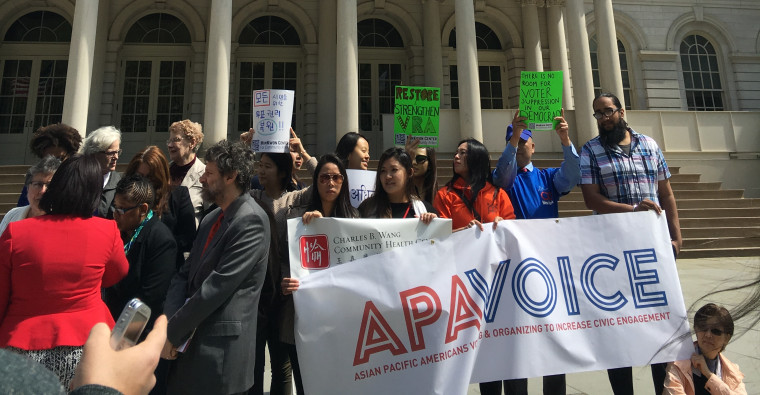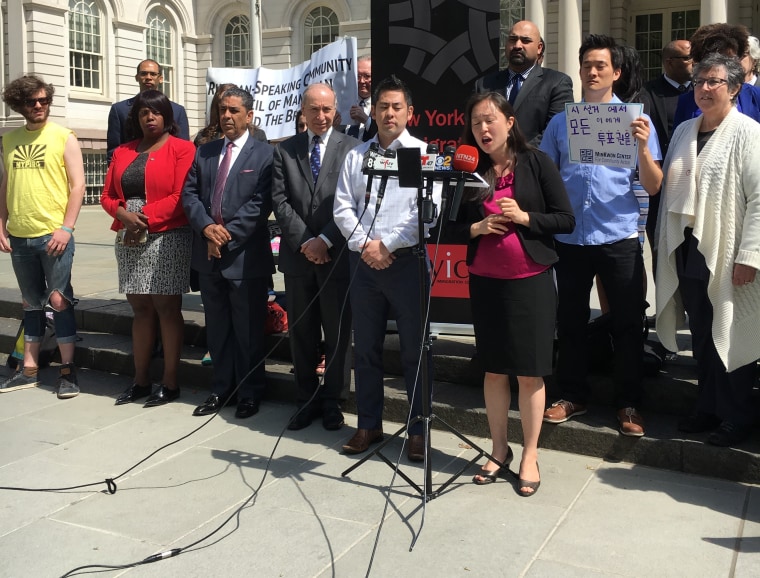Voter advocates and elected officials gathered on the steps of New York City Hall Monday morning to call for election reform in the wake of reported voter irregularities in last week's state presidential primaries and special elections.
Asian Americans, who account for roughly 8 percent of the city’s registered voters, were among those whose names were missing from voter lists, who encountered a dearth of interpreters at polling sites, and who were told in some cases to prove their citizenship before being allowed to vote, speakers at Monday's rally said.
“When people are going and finding that they cannot exercise their political right to vote, that they cannot exercise their voice, and their voices have been silenced, that is nothing short of a crime,” said Steven Choi, executive director of the New York Immigration Coalition, one of 25 organizations represented at the rally.

The complaints of voter snafus in last Tuesday’s primaries and state special elections come as New York City Mayor Bill de Blasio announced Monday that he would fund the city Board of Elections with $20 million to retain an outside operations consultant, create a blue-ribbon commission to identify failures, and improve poll worker training.
City Comptroller Scott M. Stringer, the city’s chief fiscal officer, also said last week that his office will audit the board. In a letter he sent to the body on the day of New York’s primary, Stringer voiced concerns about reports of polling sites that did not open or close on time, of underprepared and inadequately trained election workers, and of mailed notices that left out the April date for the state’s presidential primaries.
The letter also raised allegations that more than 120,000 voters were dropped from voter rolls in Brooklyn without explanation — a concern echoed at Monday’s rally.
“If we cannot have a working, dependable election, the question is what is happening to our democracy?” said Grace Shim, executive director of the MinKwon Center for Community Action, which heads APA VOICE, a coalition of 18 non-profits promoting civic engagement in New York’s Asian Pacific American community.

The city Board of Elections did not return a voicemail seeking comment Monday. Executive Director Michael Ryan told NBC 4 New York on April 20 that the board will cooperate with the audit and that "at the conclusion of this process, there's really not going to be much of a story."
Last week, the city Board of Elections suspended Brooklyn Chief Clerk Diane Haslett-Rudiano without pay, while New York Attorney General Eric T. Schneiderman launched an investigation into the board after receiving more than 1,000 complaints from voters on primary day.
“When people are going and finding that they cannot exercise their political right to vote, that they cannot exercise their voice, and their voices have been silenced, that is nothing short of a crime.”
This is not the first time the city Board of Elections has come under fire for its handling of elections. Jerry Vattamala, director of the democracy program at the Asian-American Legal Defense and Education Fund (AALDEF), said his organization has monitored every major election in the city since 1988 and has sued the city Board of Elections multiple times over the last 10 years.
He said AALDEF sent monitors last Tuesday to 18 polling sites in the 65th Assembly District, one of three special state elections held the same day as the primary. Asian Americans make up roughly 43 percent of residents in that Lower Manhattan district, represented for nearly four decades by former Speaker Sheldon Silver until he was convicted in November in a $5 million corruption case.
RELATED: Clinton, Trump Win New York Chinatown Voters Amid Election Day Issues
In one instance, Vattamala said, a voter in Manhattan’s Chinatown was erroneously told he had to vote in the primary to also participate in the special election. In another, a Chinatown voter whose name could not be located on the voter roll was instead given an affidavit ballot, he said. After poll workers found the name, the voter, who had already begun filling out the affidavit ballot, was told it was too late to vote using the regular scanned ballot, he said.
“What we have here is unacceptable,” Vattamala said. “Think about this — when you lose your right to vote on Election Day, it is lost forever.”
Voter advocates say they hope to modernize New York’s voter registration and voting process through state legislation. One such state assembly bill, sponsored by Democratic Assemblywoman Latrice Walker of Brooklyn, would amend state election law to allow for automated, same-day and Internet voter registration, as well as early voting 15 days before Election Day.
It would also require preclearance from the state attorney general’s office for changes to local or state election laws, procedures, policies and practices affecting counties in which blacks, Hispanics, Asian Americans or Native Americans make up at least 10 percent of the population.
“We understand that voting rights is something that may have taken centuries for us to achieve, but it’s going to take an eternity for us to be able to protect,” Walker said.
Asian Americans, who account for one in eight city residents, are part of an important voting bloc that is expected to double to 12.2 million by 2040, according to a report last year from the UCLA Center for the Study of Inequality and Asian Pacific American Institute for Congressional Studies.
As of 2016, at least 903,000 Asian American Pacific Islanders in New York state are eligible to vote, roughly 6.3 percent of the state’s electorate, according to APIA Vote. From 2000 to 2010, the number of eligible AAPI voters grew in New York by 33 percent.
“But when the system itself, even on its own terms, fails in the worst ways by outright denying the right to vote to thousands, the imperative for reform takes on a new meaning,” James Hong, the MinKwon Center’s director of civic engagement, told NBC News.
Follow NBC Asian America on Facebook, Twitter, Instagram, and Tumblr.